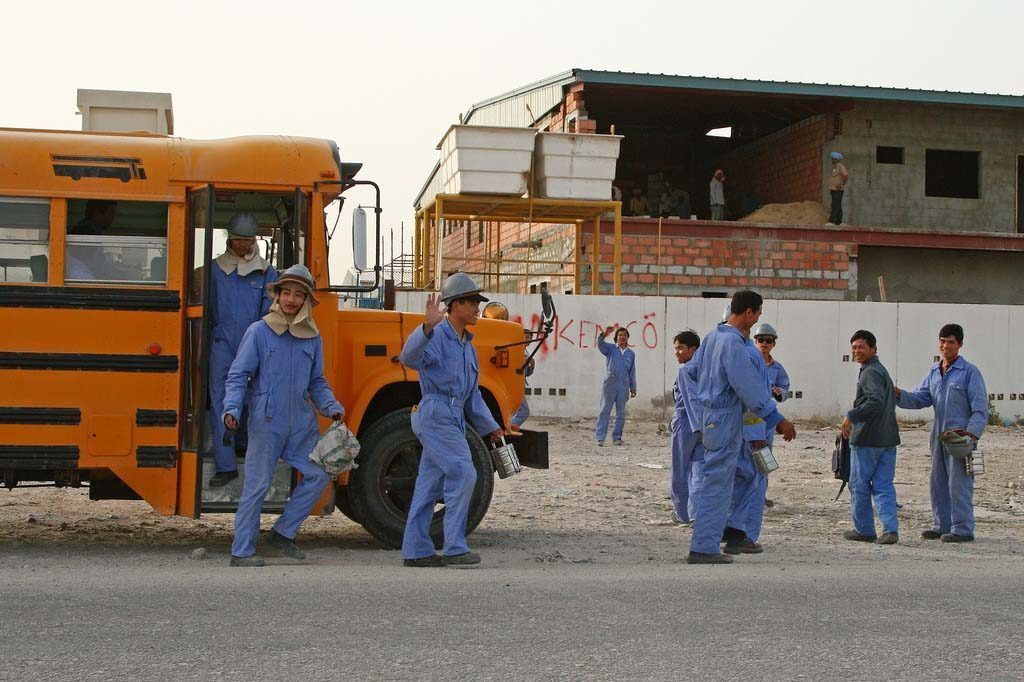The head of the English Football Association is the latest sporting official to commend the World Cup host’s progress in improving its human rights record.
World Cup host Qatar has made ‘strong progress’ in addressing human rights issues in recent years, English Football Association chief executive Mark Bullingham said shortly after reports emerged calling out migrant workers rights abuse in the country.
The sports official is part of a working group established by UEFA to gather a “better understanding of human rights” in Qatar ahead of next year’s tournament.
The group made their first visit to Qatar in August in which they met with several representatives of the International Labour Organisation (ILO), Builders and Woodworkers’ International (BWI), the National Human Rights Committee (NHRC), the Supreme Committee for Delivery and Legacy, the Qatar Football Association, as well as migrant workers.
“The first point we always make is we are not perfect ourselves as a country and I think we have to establish that early on when we talk about any other country,” Bullingham pointed, adding that the visit has helped the group get an understanding of the legislation change over the past few years.
“The legislation the Qataris have brought in over the last few years has been strong progress from a fairly low base — the removal of the kafala system, the insulation of a minimum wage, bringing through a standardised contract for workers a maximum temperature [for working] and lots of other steps forward in the legislation.” he added.
Read also: Amnesty report provides ‘Reality Check’ on loopholes in Qatar’s labour reforms
The sports official also said that the global tournament next year can act as a catalyst to lasting positive change in the Middle East.
“There is a lot of focus on Qatar but we really see the opportunity for the World Cup to drive change for the broader region where there are still challenges in other countries neighbouring Qatar as well,” Bullingham told ESPN.
“Wouldn’t it be a fantastic legacy for the World Cup if, for example, the kafala system was changed in the region as a totality rather than just focusing on Qatar? That’s our perspective.”
Ongoing Criticism
Unlike other former host countries, Qatar has been hit with significantly more criticism and controversy from western media ever since it was granted the right to host the region’s first-ever FIFA World Cup in 2010.
Topics of migrant rights, corruption allegations, and anti-LGBTQ laws have been the headlines of most international media coverage of Qatar, despite the Gulf nation implementing vigorous labour reforms.
One of the most recent was a report by UK-based media outlet the Guardian, titled ‘We have fallen into a trap’: Qatar’s World Cup dream is a nightmare for hotel staff, which mentions multiple allegations of breaches of Qatar’s labour law in the hospitality sector. The accusations include low wages, long hours, and some remanence of the Kafala system, which was dismantled by the state last year.
As a response, Qatar’s media attache to the UK Fahad Al-Mana wrote a letter to the Guardian stating that the report fails to mention the country’s progress in improving living and working standards for foreign workers.
“Qatar has never shied away from acknowledging that its labour system is still a work in progress, but we expect reporting to present the facts as they stand,” he said.
He also highlighted the impact of the reforms by revealing the number of people who have benefited since the Kafala system was dismantled.
“Over 240,000 workers have successfully changed jobs since barriers were removed in September 2020,” Al-Mana said.
“More than 400,000 have directly benefited from the new minimum wage; improvements to the wage protection system now protect 96% of eligible workers from wage abuse; and hundreds of thousands of workers have left Qatar and returned without permission from their employer since exit permits were abolished.”
Qatar welcomes ILO report on work-related incidents amid calls for transparency
Qatari authorities insist that the country has also worked on strengthening law enforcement to safeguard its workers, including vigorous inspections, swift law implementations, and several new policies to tie-up loopholes that might lead to unbalanced powers.
This is not to say that no violation has been made in Qatar since the introduction of the reforms, but Al-Mana states that systemic reform is a long-term process, and shifting the behaviour of every company takes time.
“Through its actions, the government is sending a strong message to companies that violations will not be tolerated,” he added.
The official reiterated the Gulf state’s firm commitment to cooperation, transparency and continuous improvement of its labour system.
